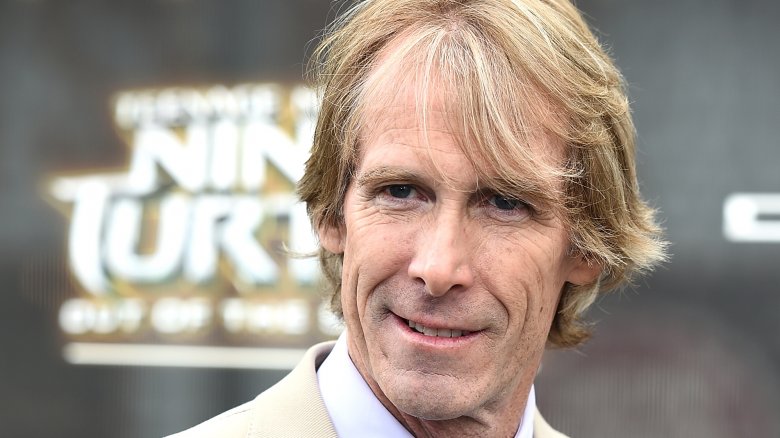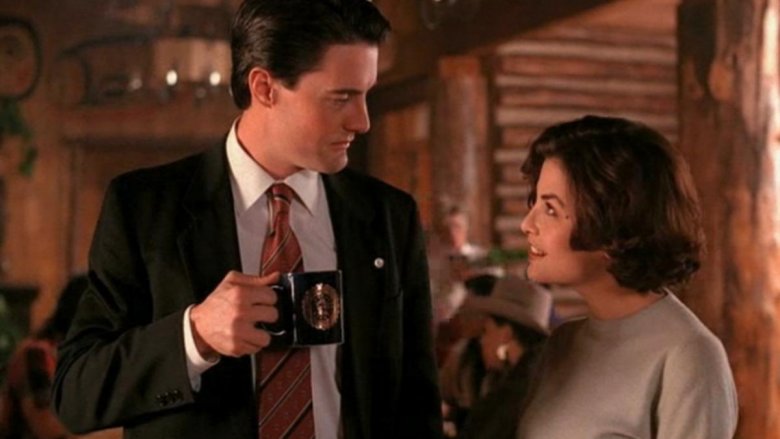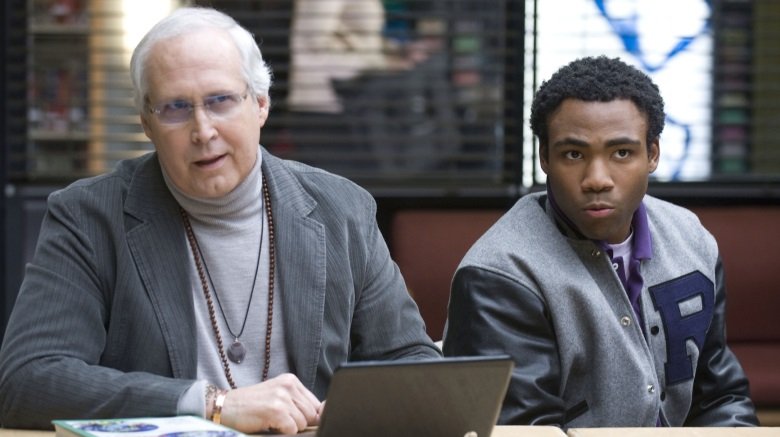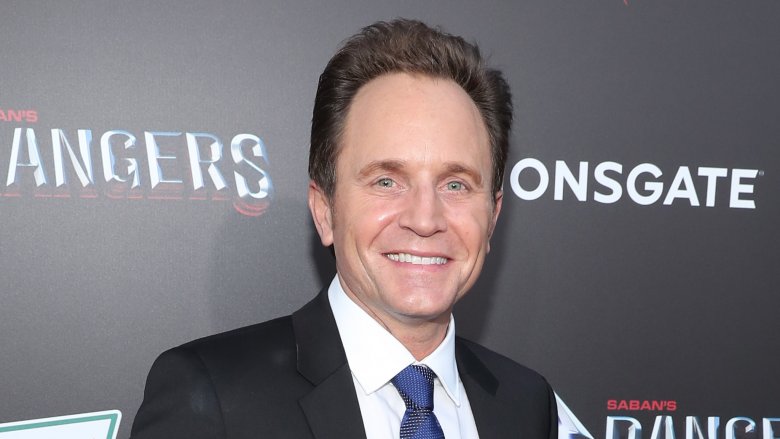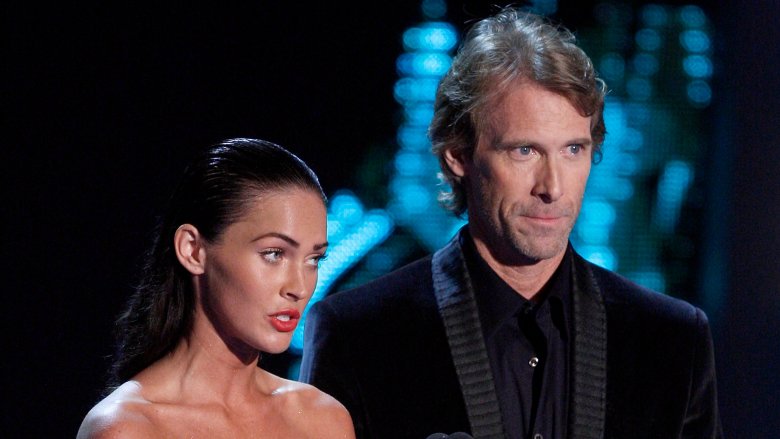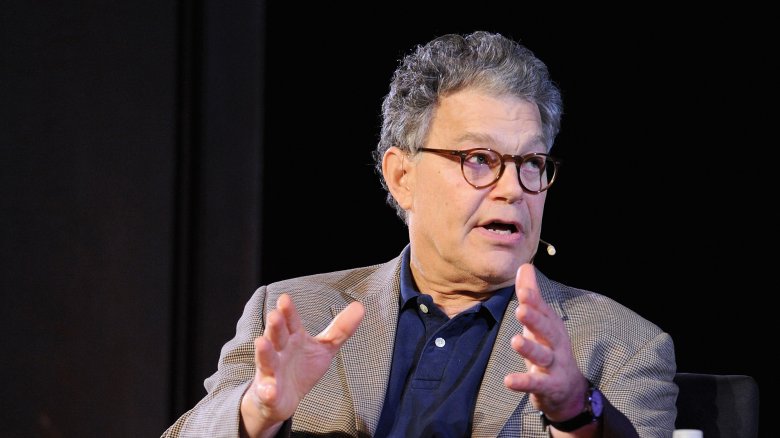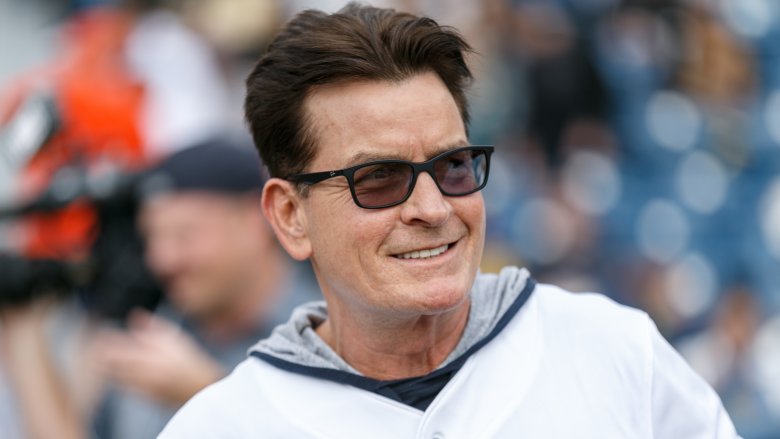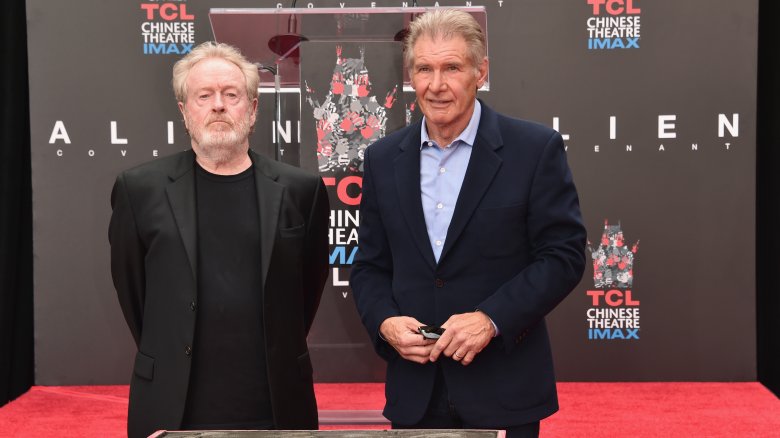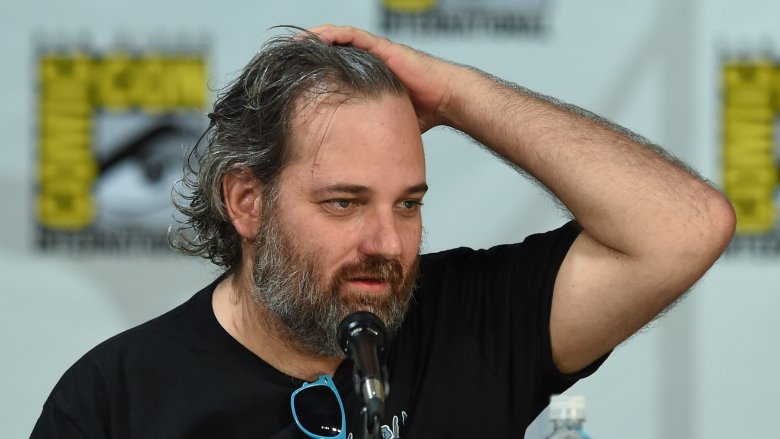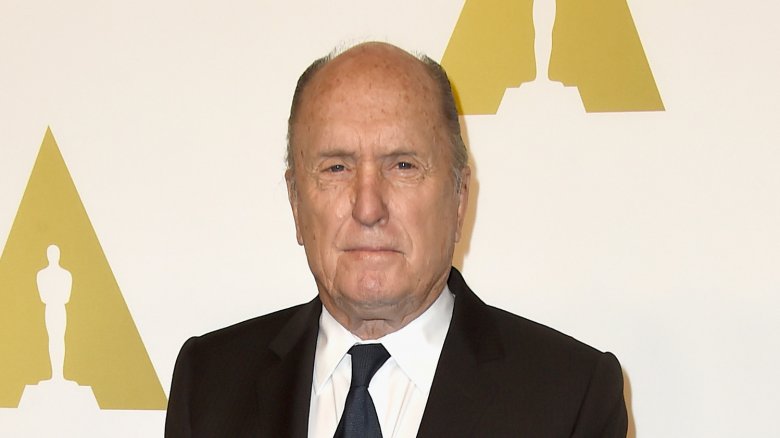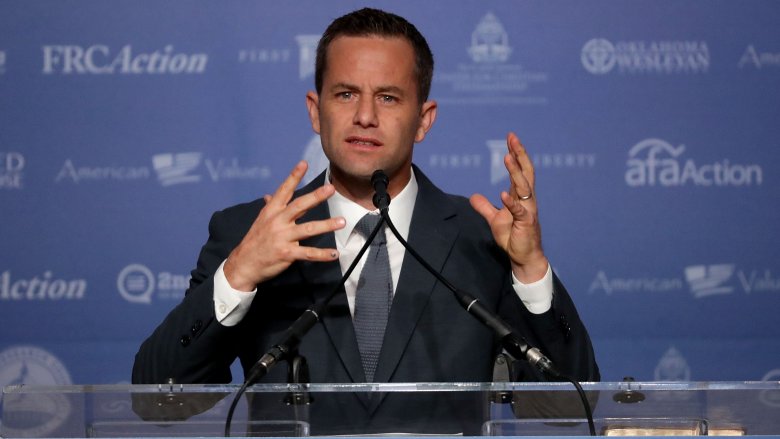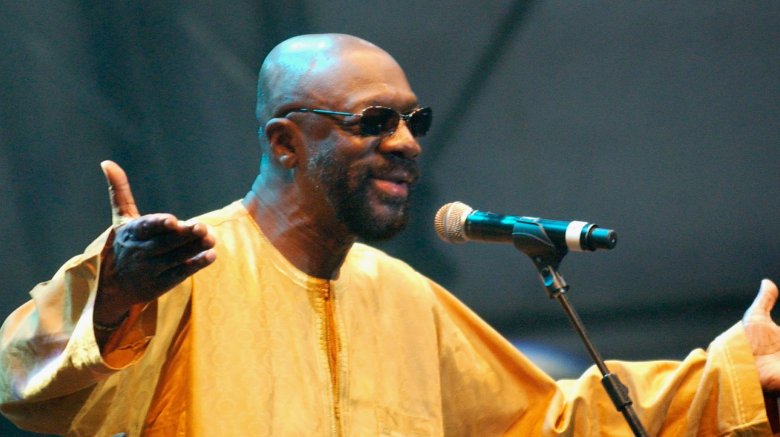Behind The Scenes Feuds That Affected Storylines
Actors, producers, and writers like to say their job is like any other job. They still go to work, get paid for their labor, and go home. This is mostly true, except for the fact that they're all working together to tell us a story. If two of the storytellers don't get along, something has to change. Maybe one of them has to leave. Perhaps changes are made to accommodate them both. Or maybe both the person writing the story and one of the people telling the story are both problematic and get kicked to the curb by the Powers That Be. (Yes, we're going to talk about Community.)
For this list, we're looking at actors, writers, directors, and the people involved with any creative endeavor who just couldn't get along, and as a result, their work suffered for it. From surreal TV procedurals to epic gangster flicks, the backstage feuds on these projects were so big that they actually affected storylines.
A Twin Peaks storyline was axed by jealousy
Much of Twin Peaks was written on the fly, ranging from David Lynch creating the role of Maddy just because he was impressed with Sheryl Lee to casting a set dresser who accidentally appeared in a shot as the overarching villain of the show. And one of those improvised moments includes the subplot between Agent Cooper (Kyle MacLachlan) and Audrey Horne (Sherilyn Fenn) that hinted at romance but ended just shy of it. This change in direction was partly the result of a feud between jealous cast members.
Nothing was planned at first between Cooper and Audrey, but their on-screen chemistry both enticed fans and had the writers thinking about where to take the plot. However, the story goes that MacLachlan convinced Lynch to drop the romance story because Audrey was too young for Cooper. But according to Fenn, it was Lara Flynn Boyle (who played Donna Hayward) who put a stop to the storyline out of jealousy. Boyle was dating MacLachlan at the time and got "mad and jealous" that Audrey was getting more attention than Donna.
So the show changed course by bringing in Heather Graham as Cooper's new love interest, Annie. Plus, Billy Zane was brought in as John Justice Wheeler for Audrey. But in a hilarious twist, it turns out that Graham is actually several years younger than Fenn.
Chevy Chase feuded with everyone on Community
In 2009, Chevy Chase picked up a role in NBC's new sitcom Community. His role as moist towelette tycoon Pierce Hawthorne should've been a career revival for him, but his prickly and combative nature saw him feud with seemingly everyone on set.
Chase repeatedly and publicly stated his displeasure with the long hours and the writing. In the early seasons, he developed a reputation for storming off sets and arguing with co-workers. He was particularly disruptive toward Donald Glover — even saying that people only thought he was funny because he's black — to the point where showrunner Dan Harmon would apologize to Glover. Chase later claimed he was joking.
Things got so bad that Harmon eventually encouraged the cast and crew to yell "f*** you, Chevy" at the season three wrap party. After Harmon eventually left the show, the new showrunners said they had a "good working relationship" with Chase, but this wouldn't last. In an October 2012 table read, Deadline reported that while expressing concern that his bigoted character was getting too racist, the comedian actually dropped the N-word.
Chase left the show in late November 2012, parting by "mutual agreement" before production on the season had ended. Writing Chase out of the show caused more headaches for the writers. Unsure of exactly when he was leaving, they had to come up with multiple contingency plans. Ultimately, he had to be written out of "Intro to Knots," with the writers reluctantly giving Pierce's role in the episode to Chang (Ken Jeong). Chase was replaced as part of the study group next season with Jonathan Banks as Buzz Hickey.
Travis Yost leaves the Blue Ranger due to behind-the-scenes bullying
Billy Cranston, as the Blue Ranger, was the brains of the original Power Rangers team. Then one day, Billy went to an alien planet as part of a storyline and never came back. This is because David Yost, the actor who played the Blue Ranger, left the set one day after he couldn't take the homophobic treatment from the Power Rangers crew.
Yost hid the fact that he was gay for the sake of his career. "I just wanted to be an actor," he explained, "and in the '90s, you didn't admit you were gay, because if you did, you weren't going to be a working actor per se." He never came out to his coworkers, but rumors started spreading. Producers would occasionally call his co-workers into their offices to ask about Yost's sexuality.
Yost realized he had a choice. He could stay another six months to finish the series and make the next movie, or walk away and stay healthy. He chose the latter and left set during lunch, his rationale being that he was called homophobic slurs "one too many times."
Producer Scott Page-Pagter disputed this by claiming Yost walked out after disagreeing over bonus. Plus, Page-Pagter also said that Yost "was the only one no one got along with." Either way, with Yost gone, the next season introduced Justin Stewart (played by Blake Foster) as the new Blue Ranger.
Michael Bay and Megan Fox feuded until she left Transformers
Michael Bay launched Megan Fox to superstardom by directing her in the Transformers movies as Mikaela Banes, and then almost killed her career after a public spat brought forward private resentment.
In 2009, Fox stated in an interview with Wonderland magazine that Bay "wants to create this insane, infamous mad-man reputation. He wants to be like Hitler on his sets, and he is." Shortly afterward, an open letter from three crew members from Revenge of the Fallen was published on Michael Bay's website, attacking Fox. She was called "dumb-as-a-rock," labeled a bad actor, and described as "the queen of talking trailer trash and posing like a porn star." Years later, multiple sources confirmed to The Daily Beast that Bay orchestrated the letter.
Bay posted his own response to the crew letter, claiming that he didn't condone the letter nor Fox's quotes about him but did enjoy working with her. He ended by saying he was looking forward to working with her on Transformers 3, later titled Dark of the Moon. But in May 2010, Fox was officially booted from the project. Rosie Huntington-Whiteley, a model with no acting experience, was brought on for the role of Carly Spencer as the new love interest.
And this is where things get blurry. Bay told GQ that executive producer Steven Spielberg told him to fire Fox. Spielberg flatly denies that. Fox claimed that it was her own decision not to return. The end result is the same, though. She didn't come back for the next Transformers movie. However, Fox said in 2018 that she and Bay are friends again, but it was too late to save Mikaela.
Al Franken's attack on Fred Silverman changed SNL
After five years running Saturday Night Live, Lorne Michaels figured it was time for a hiatus, and the most logical choice to take over the series was Al Franken, one of the show's main writers. After all, it made perfect sense. He knew all the talent, had a ton of experience, and was respected backstage. Then he decided to go a bit crazy on "Weekend Update" with a segment since called "A Limo for a Lame-o."
Franken started this segment by talking about which talent on NBC got limo service, noting that many stars did. However, Franken acted shocked that NBC head Fred Silverman was still getting limousines, considering the poor state of the network. Franken then took out a board showing the shows with the highest ratings in the country, and NBC wasn't on the list. At this point, he straight-up insulted Silverman directly, to the approval of the crowd.
After the segment, Franken was chewed out by NBC brass. He then lost any chance he had of taking over the show. Jean Doumanian was brought in as producer, and the entire cast was replaced for season six. It's often considered the single worst season in the show's history, and it saw Michaels coming back next season with yet another brand new cast.
Silverman was eventually kicked out of NBC anyway. He went on to produce Thicke of the Night, one of the most famous talk show bombs of all time. So yeah, maybe Franken was right.
Charlie Sheen was winning until he lost his contract
Charlie Sheen was always a bit of a wild man, but in 2011, he lost his mind and the TV role that defined him for a decade.
Sheen played Charlie, the playboy of Two And A Half Men saddled with raising a child. Sheen's real life famous sexcapades, coupled with the shared first name, brought legitimacy to the role. However, that all came to a crashing halt with Sheen's infamous meltdown. There was him insulting showrunner Chuck Lorre, there were the crazy interviews, and there was the "tiger blood." Most importantly, there was "winning," a phrase that spawned countless memes and an autotune remix.
Sheen did seemingly everything in his power to get fired from the show, and the inevitable happened in May 2011 when he was shown the door. His character was killed off to start the next season and replaced with Ashton Kutcher for the remainder of the show. Of course, the character of Charlie was brought back one last time (but not Sheen), where he was killed off once and for all in the bonkers finale.
Ridley Scott and Harrison Ford argue over Blade Runner
Ridley Scott's seminal sci-fi movie Blade Runner tells the story of a future where human-like robots named Replicants walk among us. The film also features an open-ended question: Is Rick Deckard (Harrison Ford) a Replicant? Well, that depends on whether you're asking Ford or Scott.
Ford and Scott butted heads over much of the story. They disagreed over whether there should be a noir-like voiceover. Most importantly, they disagreed over the ending, with Ford believing that Deckard was human, while Scott totally believes Deckard is a Replicant.
As such, there are multiple versions of Blade Runner, with notable discrepancies between the theatrical and the director's cut. The theatrical cut includes the voiceover and heavily implies that Deckard is a human, while the director's cut drops the narration and is way more ambiguous with its ending.
Fans have spent decades since debating whether Deckard was a Replicant, as well as which cut is more valid, with the open-ended nature leading to Blade Runner 2049.
Dan Harmon feuds his way off Community
Dan Harmon is one of the more famous showrunners on TV, currently producing Rick and Morty and hosting his own podcast, but he remains most famous for NBC's cult hit, Community. During the show's height of popularity, however, he angered enough people backstage that he was fired from his own show.
Harmon is famously abrasive, described as a "brilliant hurricane" by his writers, and is noted for prickly fan interactions. And after encouraging his crew to chant "f— you Chevy" at a wrap party, Chevy Chase left him an angry voicemail. Harmon then played this voicemail at live events, and at one of them, it was recorded by a fan and uploaded to the internet. He also argued with NBC management at every available moment. Years later, Harmon admitted he was going through a bad time in his life during his tenure as showrunner.
Harmon was fired and replaced with new showrunners for season four, which brought nowhere near the acclaim as the previous seasons. As a result, season four is known as the "gas-leak year," where none of the characters acted right. Fortunately, Harmon returned for season five and spent much of that time righting the ship.
Francis Ford Coppola made Robert Duvall an offer he could refuse
The Godfather Part III is the black sheep of the Godfather franchise. While few would call it a bad film, it falls short of expectations set by two of cinema's all-time classic entries. There are many reasons for this, but one of the prime ones may be due to a script rewrite after Robert Duvall and Francis Ford Copolla couldn't agree on money.
Robert Duvall's character of Tom Hagen, the Corleone family's consigliere, was set to have a substantial role. Early drafts show his name throughout the script, but as with most things in Hollywood (and, frankly, life), things changed because of cash. Duvall recognized that the main motivating factor for Part III was money. Why else, in his estimation, would they make a third film all these years later? He was fine with being paid less than Pacino by half — not thrilled, but fine — but found it unacceptable that he'd be paid more than four or five times less.
As such, Hagen was killed off between the events of Part II and Part III. Fans never got to see if he'd take sides against family or support Michael Corleone one last time. Instead, they got to watch the last breath of a franchise.
Kirk Cameron's faith majorly affected a sitcom's storyline
Kirk Cameron's acting career is split into two different, distinct parts: "teen heartthrob" and "Christian movies." In the middle, there was Growing Pains ... and a cast and crew left frustrated by the newly religious star.
Cameron was an atheist until about age 17, when he became a born-again Christian. His newfound faith coupled with his immaturity caused problems with what used to be a tight-knit cast and crew. Early in the series, no birthday or major event would pass without everyone being involved. Towards the end, Cameron didn't invite a single cast member to his wedding.
These issues existed outside of personnel, as Cameron caused problems up the chain of command, which led to storylines getting changed and people leaving their jobs. He started arguing with the writers and tried to remove any material he found objectionable to his faith. Cameron complained to ABC by calling the shows' producers "pornographers," which led to those producers quitting instead of dealing with him anymore.
The most infamous incident involves Julie McCullough, brought on as nanny Julie Costello. However, McCullough quickly left the show, and many blame her Christian co-star. The rumor for years was that Cameron objected to her appearing in Playboy, but Cameron insisted later that her role was temporary. Either way, it sounds like Growing Pains was really painful to make.
Isaac Hayes lost friends in South Park
South Park has never been a stranger to controversy, and "Trapped in the Closet" remains one of its most contentious installments. The episode sees Stan joining Scientology and causing a whole mess of problems for all parties involved. The episode also ignited a feud that saw the show lose fan-favorite character Chef, voiced by Isaac Hayes ... a devout Scientologist.
In March 2006, Hayes quit South Park via a statement issued in his name. "There is a place in this world for satire," it said, "but there is a time when satire ends, and intolerance and bigotry towards religious beliefs of others begins." Co-creator Matt Stone responded by saying that, "Isaac never had a problem with the show making fun of Christians, Muslims, Mormons, and Jews. He got a sudden case of religious sensitivity when it was his religion featured on the show." Nonetheless, Hayes was released from his contract. Months later, Hayes told the New York Post that he wasn't paid enough and was treated poorly. None of this sat quite right with Stone and co-creator Trey Parker.
So Parker and Stone responded with the season ten premiere "The Return of Chef," where Chef is killed off in a violent manner. But in 2016, Hayes's son, Isaac Hayes III, said his father "did not quit South Park; someone quit South Park for him." Hayes was recovering from a stroke at the time of the controversy, and he was in no position to issue any kind of statement. Hayes III notes that his father was surrounded by Scientologists, and that one of them most likely quit on his father's behalf.
